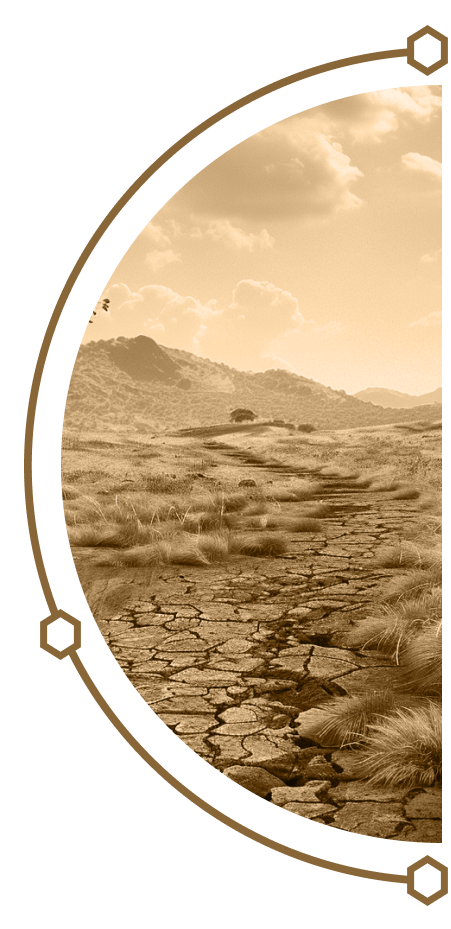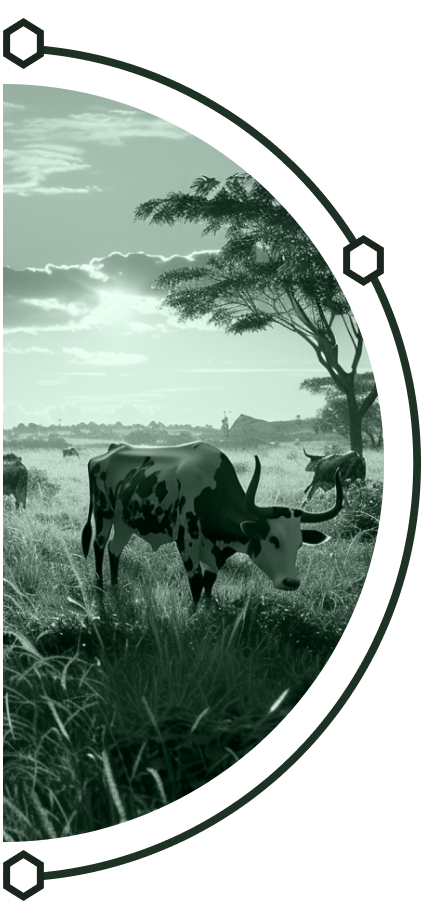An Update from Uganda
As 2024 drew to a close, we paid a visit to the ranch in Uganda after our initial visit in October to the Mayogoma Ranch. The changes we made then – limiting
Welcome to WildeBeef, where tradition meets innovation in the heart of Uganda. Our project is at the forefront of transforming cattle farming into a powerful tool for ecological restoration and community empowerment. By implementing regenerative grazing techniques, we’re not only enhancing the fertility of the land but also reviving the vast, biodiverse savannahs of Africa. Join us on our journey to create a sustainable future where beef production supports environmental health and economic growth.



At WildeBeef, we envision a world where agriculture coexists with nature. Our initiative aims to reverse land degradation, boost biodiversity, sequester carbon, and elevate the living standards of local communities through sustainable beef production. Here, every cow contributes to the regeneration of the land, ensuring that Africa’s savannahs thrive for generations to come.
Restore your grasslands with our expert team. We’ll help you.
Our ability to combine expertise and systems thinking is what fuels us as a team.
Diederick is a South African veterinarian, trained at the University of Pretoria’s faculty of Veterinary Science, who practiced in the United Kingdom for over 30 years. Diederick’s career in the UK has included running his own veterinary practice doing small animal clinical work as well as founding several other businesses in UK’s agribusiness space providing a wide range of services such as statutory carcass classification services for meat and livestock, import and export inspections services for products of animal origin moving between the UK and the EU, etc.
Diederick also comes from a cultural farming background and has a strong interest in farming, nature and, particularly, cattle. This interest, along with key insights gleaned from his professional experiences, led him to founding WildeBeef and dedicating himself to activating cattle in the service of nature.
Ernest is a Ugandan Data Scientist and Actuary. Ernest graduated from Michigan State University with a Bachelor of Science degree in Mathematics and from Columbia University with a Master of Science degree in Actuarial Science before going on to practice as a Data Scientist and Actuary based out of New York City. Ernest’s 10-year professional career so far has seen him work extensively at the intersection of data and computers to solve problems, primarily in the context of the business of insurance. These experiences have given Ernest a keen understanding and passion for how data-driven technology (blockchain and Artificial Intelligence) is changing the world for the better, ultimately bringing him to the WildeBeef project where he has played a key role in crystallizing the vision around technology.
Ernest also comes from a cattle-keeping cultural background in Uganda and is especially excited about the potential of the WildeBeef idea to have a strong positive impact on the socioeconomic condition of cattle-keeping communities.
Jon is Director at RSK Wilding, a UK company dedicated to restoring nature. Jon set up Wilding in early 2020 with the aim of using the UK’s upcoming Biodiversity Net Gain legislation to create a network of habitat creation and restoration projects, all funded by developers through the planning system. Jon also works closely with Wilding’s colleagues in Nature Positive, who work with corporations around the world to improve their carbon and biodiversity performance and reduce their impacts.
Jon and his company RSK Wilding will play a key role as independent 3rd party assurance players helping the WildeBeef project study and evidence its environmental claims.
Gerhard is a South African veterinarian and farmer. He owns and runs a family farm (2,965 acres) near Swartruggens, South Africa, on which he has lived with his wife since the year 2000. He is an expert on the application of holistic grazing methods for cattle to regenerate land, having personally implemented them on his farm over a span of more than 10 years with impressively transformational results. Gerhard also operates an IVF cattle embryo laboratory.
Gerhard will be responsible for the implementation of the regenerative grazing methods, including training and building a team of local practitioners to ultimately scale the work.
Albert is a marketing consultant and specialist in marketing communications, strategy development and brand activation. Albert has worked with various large corporates as marketing manager, project manager and creative director. His various projects have involved television production, destination marketing (he’s launched three city brands, including Durban, South Africa), corporate communications and public relations, sports sponsorship and management, etc.
Albert will lead the WildeBeef project’s marketing and branding efforts.
Ashleigh is a graduate of Politics, Philosophy and Economics, as well as Journalism. She has a special interest in environmental governance and justice and wants to further engage with governments and stakeholders in the realm of sustainable beef farming and the regeneration of Africa’s savannahs. Ashleigh’s experience is in sustainability policy drafting and journalism, and she is heading up our copywriting and social media campaigns.
Martha has engaged extensively in East and Southern Africa to expand market access opportunities for food and agriculture products through; (i) supporting governments to implement sanitary and phytosanitary (SPS) regulatory reforms and(ii) helping companies to meet SPS requirements of the importing countries. Born into a cattle ranching family, together with her siblings they run a beef cattle ranch in South Western Uganda. After many years of international development work on the African continent, she has engaged with Wildebeef, and is currently collaborating with other ranchers in her community to restore the Ankole savanna grassland and establish a high value sustainable beef brand for domestic, regional and international markets.
In the WildeBeef project, we harness blockchain technology to revolutionize how agricultural ventures are managed. Blockchain provides an immutable ledger that ensures every transaction, from the grazing patterns to the sale of beef and carbon credits, is transparent and traceable. This technology guarantees fair play, empowering every stakeholder with real-time data and fostering trust in our sustainable practices.
Restore your grasslands with our expert team. We’ll help you.
Every participant in the WildeBeef project can trace the journey of their beef from pasture to plate, verifying its sustainable credentials
Blockchain ensures that economic benefits are distributed equitably among farmers, landowners, and community members, reflecting their contributions accurately.
Secure, tamper-proof records mean that certifications for sustainability and fair trade practices are indisputable, enhancing market trust and value.
Streamlined processes reduce overhead costs, making sustainable practices economically viable at scale.
Regenerative Grazing Explained
Our adoption of mob grazing is not merely about cattle management; it’s a holistic approach to land rejuvenation. This method mimics the natural movement of wild herds, leading to:
Intensive but brief grazing periods followed by long rest periods allow for soil regeneration, improving its structure, fertility, and carbon storage capacity.
By managing grazing to emulate natural herd behaviors, we encourage diverse plant growth, providing habitats for wildlife and increasing ecosystem resilience.
Our practices aim to turn the savannah into a carbon sink, with studies suggesting significant potential for carbon capture in grassland ecosystems.
Intensive but brief grazing periods followed by long rest periods allow for soil regeneration, improving its structure, fertility, and carbon storage capacity.

By managing grazing to emulate natural herd behaviors, we encourage diverse plant growth, providing habitats for wildlife and increasing ecosystem resilience.

Our practices aim to turn the savannah into a carbon sink, with studies suggesting significant potential for carbon capture in grassland ecosystems.

Through better yields and quality, coupled with access to premium markets, local farmers see substantial income improvements, fostering economic growth.
We monetize ecological benefits by selling carbon and biodiversity credits, providing an additional revenue stream that rewards sustainable practices
Ongoing research in collaboration with environmental scientists ensures our methods evolve with the best available science, maximizing our positive impact on the environment.
WildeBeef stands as a testament to how modern agriculture can serve as a catalyst for ecological repair and social upliftment, all while providing the world with premium, ethically produced beef. Join us in this transformative journey towards a greener, more equitable future.

Most asked questions on the project’s goals, methods, benefits, and how they can engage with or support WildeBeef.
The WildeBeef Project is an innovative initiative aimed at restoring African savannah habitats through sustainable cattle farming, utilizing regenerative grazing practices and blockchain technology.
Regenerative grazing, specifically mob grazing, helps restore soil health, increases biodiversity, improves water retention, and significantly boosts carbon sequestration in the soil, thereby contributing to climate change mitigation.
Mob grazing involves moving large herds of cattle frequently across the land to mimic the movement of wild herds. This prevents overgrazing, allows for plant recovery, and promotes a healthier ecosystem.
Blockchain technology in WildeBeef ensures transparency, traceability, and equitable benefit distribution. It records every transaction and movement, ensuring that all stakeholders can trust in the sustainability and fairness of our operations.
Currently, we are focusing on building our local and regional markets, with plans to expand our export capabilities. Stay tuned for updates on international availability.
Carbon credits represent the reduction of greenhouse gases, and nature credits highlight biodiversity improvements. WildeBeef sells these credits to companies looking to offset their carbon footprint or invest in biodiversity, creating additional revenue streams that support our sustainable practices.
We combine traditional cattle breeds with internationally recognized beef varieties through careful genetic selection, alongside our regenerative grazing practices, to produce high-quality, sustainable beef.
Our project increases income for local farmers through higher beef yields and quality, provides training in sustainable practices, and involves communities in the cooperative venture, fostering socio-economic development.
We provide full transparency through blockchain, regular environmental impact assessments, and third-party certifications that verify our sustainable and regenerative practices.
While our focus is on sustainability and regeneration, we adhere to organic principles where feasible. However, certification might vary as we prioritize ecological restoration over strict organic labeling.
We welcome partnerships, investments, and support. Please contact us through our website for information on how to engage with or contribute to our project.
We're researching and implementing practices that naturally reduce methane, like improving cattle diet diversity, which studies show can lower methane production in ruminants.
By restoring savannah ecosystems, WildeBeef not only supports cattle but also enhances habitats for native wildlife, contributing to the conservation of biodiversity in the society at large.
Most asked questions on the project’s goals, methods, benefits, and how they can engage with or support WildeBeef.
As 2024 drew to a close, we paid a visit to the ranch in Uganda after our initial visit in October to the Mayogoma Ranch. The changes we made then – limiting
At the heart of Equatorial Africa’s ecosystems lies a critical component that has long been overlooked: climax grasses like Panicum maximum (Guinea grass). These perennial species once dominated the region’s landscapes, playing
The WildeBeef project is an innovative effort that leverages blockchain technology to coordinate the implementation of regenerative grazing practices among cattle-keeping communities in Africa.